Stopping by: Food, and respect, for everyone
Arriving on foot, on bikes or by bus, people start gathering around the Soup Kitchen at St. Barnabas in mid-afternoon, awaiting the start of the 4 to 6 p.m. dinner service.
Sometimes they come inside to escape the cold or damp. Other times, they hang out on the driveway, talking and laughing. Regulars seem to love the camaraderie with one another, soup kitchen manager Robin Miguel and the volunteer cooks and servers.
Newcomers are welcome, too. Everyone is welcome, no questions asked. There is no sign-in. No proof of need is necessary. And diners are treated with respect, Miguel said. The only requirement is that they be respectful and follow a few basic rules, such as no fighting and no drugs.
No church affiliation is required, either, and no group prayers are said before dinner. Patrons can pray if they like, of course, but the soup kitchen never serves up doctrine, board member Tom Tankersley said.
Board members themselves do pray. At each meeting, they ask to keep doing what they’re doing, providing nutrition for anyone in need, he said
Tankersley said the board — made up of people from the church and from the community, including, at times over the years, soup kitchen patrons — also reflects the nonprofit’s mission statement: “To feed the hungry of Yamhill County; treat our guests with the dignity and love we would a guest in our own home; provide others the opportunity to serve.”
The name “soup kitchen” may conjure up the image from the 1930s of volunteers ladling thin soup into bowls held up by impoverished people in a long line.
If so, then this is no soup kitchen. It’s more like a restaurant where the special of day is served free to all, typically more than 100.
Diners sit down at tables set with placemats, silverware and cups for milk or water. There’s often a centerpiece. A coffee urn bubbles near the entrance, alongside a big bowl of apples or other fruit that can be eaten there or taken as people leave.
The day’s special is marked on a sign at the entrance: Broccoli-cheddar quiche. Hearty minestrone soup. Rice with bechamel sauce. The generous, healthful entrees are made with as many fresh ingredients as possible.
Volunteer servers come to the table and take orders. It’s especially important to Miguel, the board and everyone else involved with the program, that diners are served. It’s more dignified and more pleasant, and encourages positive behavior, as well, they said.
“These are our guests,” said Sharon Hunt, who has been helping with the soup kitchen since its early years.
Along with the entree, diners are asked if they’d like a green salad, too. And they’re given a choice of dressings, such as Italian, balsamic vinaigrette made in-house by Miguel, or — by demand — Hidden Valley Ranch.
Sometimes there are extras, too. On March 3, when the Soup Kitchen at St. Barnabas marked its 30th anniversary, servers brought slices of cake to tables filled with regulars, visitors and board members.
Michelle Bladine, Ann Shuler and Michelle McLaughan from St. Barnabas started the soup kitchen in 1990. Hunt, Barbara Frum and others soon became involved, as well.
Their efforts were triggered by a hungry family that came to the church, asking for food.
On the first day, the soup kitchen’s records show, they served three people five meals. “Someone asked for seconds,” Hunt said.
From the beginning, the soup kitchen has been about more than food. It’s been about dignity as well as love, she said.
Hunt recalled times in her life when she had to ask for help and people looked at her “as if I had my head on crooked,” she said.
That’s not the case at the soup kitchen, she said. “People are not treated like that here.”
Located in the basement of the church at 822 S.W. Second St., the soup kitchen program grew quickly.
At first, meals were served one day a week, then two, then three.
Seven years ago, a gift from an anonymous donor allowed the program to expand to four days. Then the donor offered more money to expand to five days.
Board members discussed it. One of their concerns was having enough volunteers.
Soup kitchen patrons themselves offered to wait tables; after some consideration, Tankersley said, the soup kitchen started Monday through Friday service about 18 months ago.
“When you serve freely, you get blessed,” Tankersley said.
Volunteers do much of the preparation and serving. Miguel said she usually has 9 to 12 or more volunteers over the course of each day.
They donated 635 hours in January 2019 and 738 hours this January. Throughout 2019, volunteers racked up 7,643 hours of service, or about 637 hours a month.
Some are members of service clubs or Christian groups. Others are students, including many from nearby Duniway Middle School. Miguel said one former DMS student, now in college, still helps when she’s home.
Miguel is the only paid employee. Everyone else, from servers to board members, is a volunteer. That includes the soup kitchen’s executive director, Helen Durany, the rector at St. Barnabas.
The nonprofit organization buys some food and gets some through the YCAP food bank. Many local businesses contribute, including Red Fox Bakery, which delivers day-old bread, Nick’s restaurant, and Albertsons, Fred Meyer and Winco grocery stores.
Other churches and organizations such as the Chamber Leadership group help, too. The latter raised money for a new dishwasher.
Individuals and estates give donations. Tankersley said the board reserves 10 percent for operations in future years, puts some into a six-month rainy day fund, and stores the rest in the capital improvements fund.
“There was a time we were worried,” he said, recalling the 2008 recession when calls for meals rose as the economy tanked. Demand has never dropped to its pre-recession levels, he said, but “we have a cushion now.”
The church covers the soup kitchen under its 501(c)(3) designation and insurance.
The St. Barnabas congregation and other community members also contribute, especially during gardening season, when Miguel finds heaps of ripe tomatoes, squash, beans and fruit awaiting her at the kitchen.
She enjoys devising ways to use the fresh produce. For instance, when she had “a boatload” of celery, she paired it with rice, sausage and a bechamel, or white, sauce. Diners loved it.
Still, she joked, her creativity can’t always invent enough ways to use the annual onslaught of zucchini. Still, she’s happy to face the challenge, slicing, dicing and grating it into a variety of dishes.
Working to make the best use of ingredients and keep costs down, Miguel plans a monthly menu. Her March menu includes red beans and dirty rice, the very popular roll-your-own burritos, pasta carbonara and poutine baked potatoes, a play on the Canadian favorite of french fries with brown gravy and cheese curds.
One Monday a month, the special is “Mel’s Chili,” named for longtime volunteer cook Mel Kelchner.
Kelchner has been cooking at local food ministries for 23 years. He started at First Baptist Church, then moved to the soup kitchen, where he spends every Monday.
He also prepares food for events at the Yamhill Valley Heritage Center museum.
“I get a chance to cook,” he said. “I just like to cook.”
He also likes to help. “People need good, nourishing food,” he said.
Kelcher said it’s important to him that the food is tasty. “I put out something I’d like to eat,” he said.
He appreciates that Miguel, who’s also the volunteer coordinator and chef, emphasizes fresh ingredients, rather than canned, and incorporates garden produce in season.
Years ago, Kelchner said, the food kitchen served numerous casseroles. One-dish meals are less common these days, he said, but once in a while he suggests serving tater tot casserole. People laugh.
A lifetime resident of the McMinnville and Amity area, he and his three older sisters grew up on a 13-acre farm where his family kept chickens, cows and pigs.
He learned to cook in 4-H classes. When he was old enough, he started entering the Yamhill County Fair.
“I entered brownies and beat my sisters,” he said proudly.
Miguel, the chef, also loves cooking -- especially at the soup kitchen.
“I love my people,” she said. “I love feeding 100 people on not a lot of money, and seeing how they care for each other.”
Miguel is the daughter of a mother who had four children before she was 22. She said she grew up on the streets of New York City.
When she decided on a career in food service, she trained under several master chefs, learning European techniques. She cooked in restaurants and other venues for 22 years, and served as a private chef for two presidents of Nationwide Insurance.
Then, after taking a break to be a caregiver for a dying friend, she decided the culinary world was no longer right for her. She worked for a hospice program, instead, for a decade.
Then she saw a job listing for the soup kitchen position.
“Here I am,” she said. “Now I take care of people with food.”
She also mentors young people, especially women, some of whom she meets at the soup kitchen. She tells them they can overcome their backgrounds.
“One of the best things is seeing their success,” she said. “Seeing them get off drugs, get over problems, graduate and find their passion, whatever that is.”
Diners: ‘This place is great’
Jessie Harker visits the Soup Kitchen at St. Barnabas often. He said he enjoys the good food.
“It’s good for the community, too,” said Harker, who usually makes a cash donation on his way out. “It’s a very good place. People can come when they’re hungry and get something to eat.”
He and other regulars agree that chef Robin Miguel, who has led the soup kitchen for five years, is “awesome.”
Neal Gettman joked, “just don’t irritate her!”
Miguel enforces the rules, he said, which is good. “You just have to behave yourself,” he said.
Gettman has been coming to the soup kitchen for many years. He and his friend, Pam White, dine there almost every day.
“This place is great,” he said.
He teases Miguel by calling the food “edible,” by he actually thinks it’s wonderful.
Gettman is diabetic and allergic to pork and turkey. So he really appreciates that Miguel accommodates his dietary needs.
White, a cancer survivor, values that as well. She’s been cancer-free for almost 11 months, thanks to finding the cancer early and having surgery, she said.
She said she feels welcome at the soup kitchen. “I care about people,” she said, and she knows the people at the soup kitchen care about her.
BY THE NUMBERS
In January 2019, the Soup Kitchen at St. Barnabas served 2,783 sit-down meals, including seconds and thirds.
Another 714 meals were offered to go — usually leftovers packaged for diners to eat later.
The number served was 2,184, including 1,268 men, 683 women and 233 children.
Over the course of the year, 27,426 meals were served, averaging 2,286 per month. Demand was highest in January through March and in August through October.
In January 2020, the soup kitchen served 2,186 meals and 714 to-go packages to 1,715 people, including 1,026 men, 638 women and 104 children.
On Jan. 1, 2020, only 53 meals were served, but the numbers picked up through the month, with peak days of 140 and 145.
That’s typical, chef Robin Miguel said. As the month wears on and money and other food assistance dwindles, more and more people come to the soup kitchen for dinner.



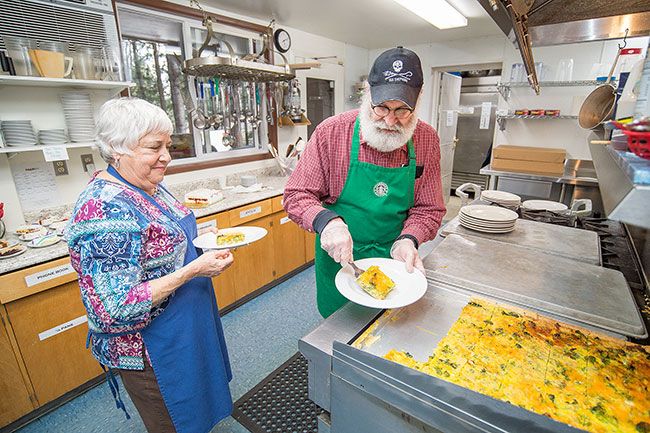
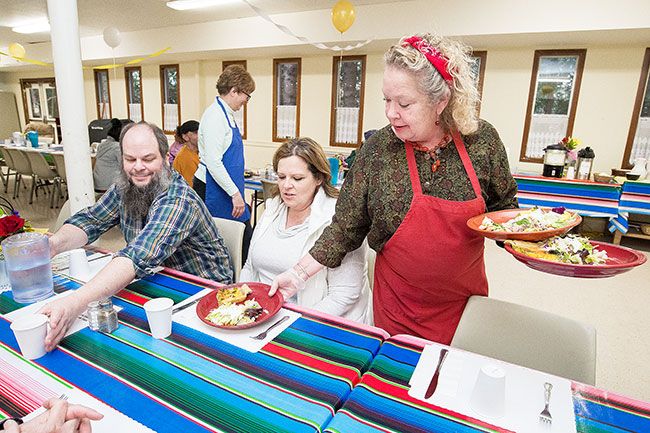
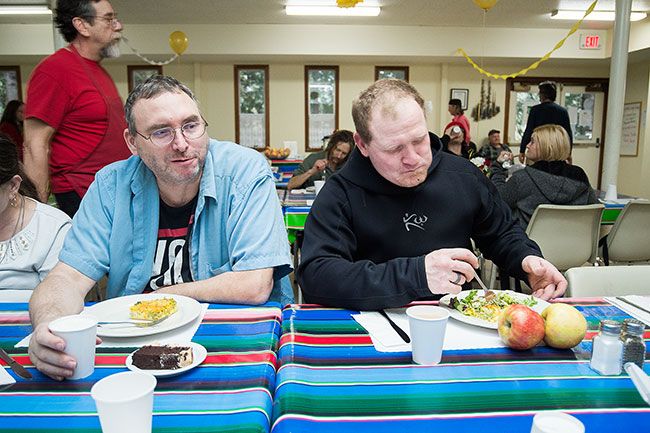
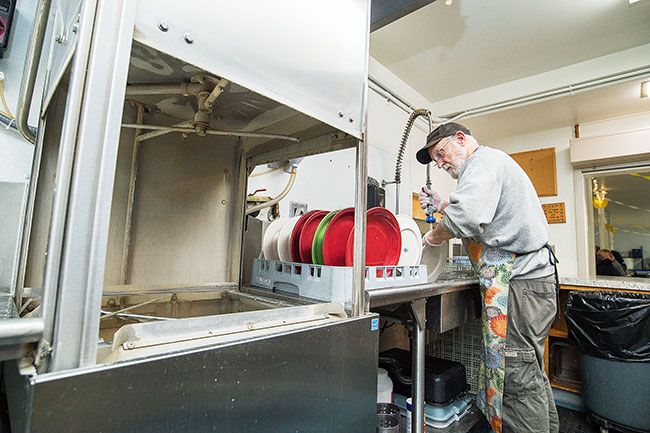
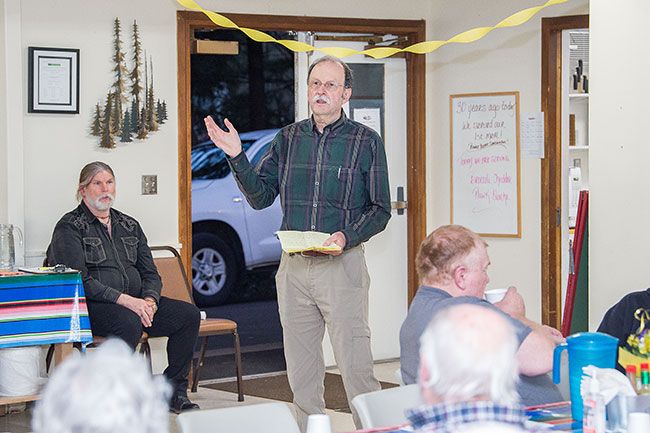
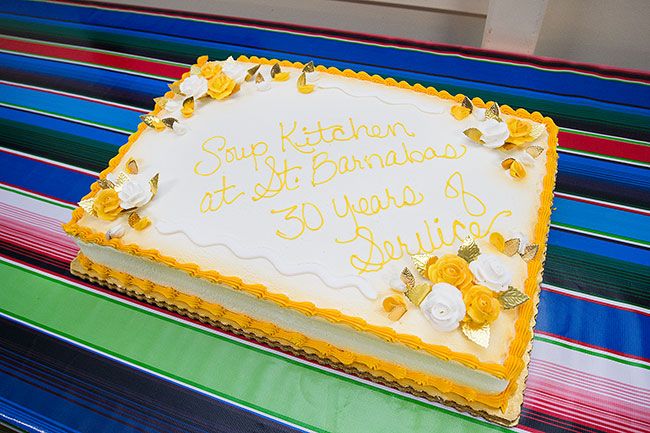
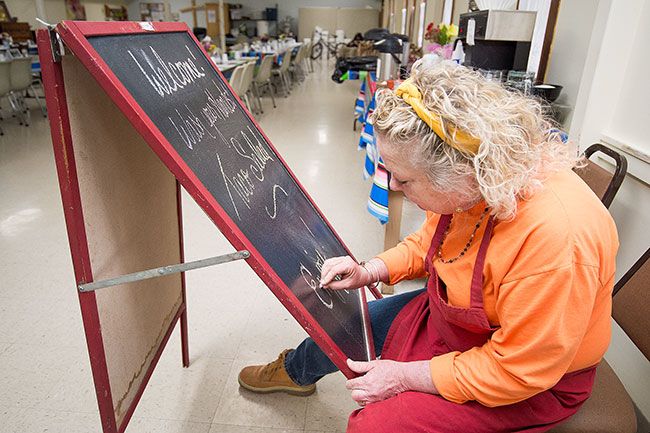





Comments